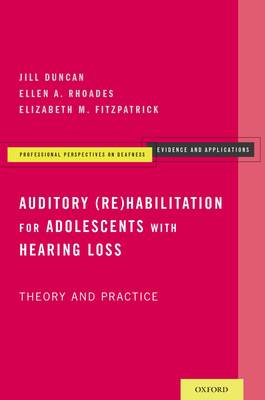
- Retrait gratuit dans votre magasin Club
- 7.000.000 titres dans notre catalogue
- Payer en toute sécurité
- Toujours un magasin près de chez vous
- Retrait gratuit dans votre magasin Club
- 7.000.000 titres dans notre catalogue
- Payer en toute sécurité
- Toujours un magasin près de chez vous
Auditory (Re)Habilitation for Adolescents with Hearing Loss
Theory and Practice
Jill Duncan, Ellen A Rhoades, Elizabeth M Fitzpatrick
149,45 €
+ 298 points
Description
There is a growing realization that many adolescents with hearing loss require special attention. Despite the benefits of early diagnosis, early amplification, and early intervention, some adolescents with hearing loss do not achieve age-equivalent developmental milestones. The purpose of this book is to assist auditory (re)habilitation practitioners in mitigating the negative effects of hearing loss on communicative, socio-emotional, and academic performance of adolescents who rely on auditory-based spoken language to communicate. It is essential that adolescents whose parents chose auditory-based spoken language receive systematic, consistent, well-planned, appropriate auditory (re)habilitation. In Auditory (Re)Habilitation for Adolescents with Hearing Loss, Jill Duncan, Ellen A. Rhoades, and Elizabeth Fitzpatrick provide practitioners with key milestones considered fundamental to understanding adolescents with hearing loss as well as a pedagogical foundation and general intervention strategies for both planning and direct face-to-face (re)habilitation with adolescents. The authors summarize important issues related to the spoken language development of adolescents, focus on aspects of communication that are functionally relevant to adolescents with hearing loss, and provide strategies for facilitating auditory-based spoken communication skills. They conclude with a discussion of factors influencing auditory (re)habilitation, both in service delivery and outcomes, and provide the application of theory to practice through a demonstration of case studies.
Spécifications
Parties prenantes
- Auteur(s) :
- Editeur:
Contenu
- Nombre de pages :
- 448
- Langue:
- Anglais
- Collection :
Caractéristiques
- EAN:
- 9780195381405
- Date de parution :
- 02-05-14
- Format:
- Livre broché
- Format numérique:
- Trade paperback (VS)
- Dimensions :
- 155 mm x 231 mm
- Poids :
- 598 g







